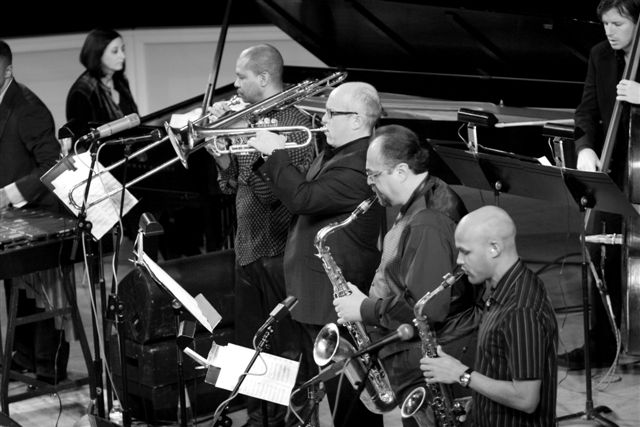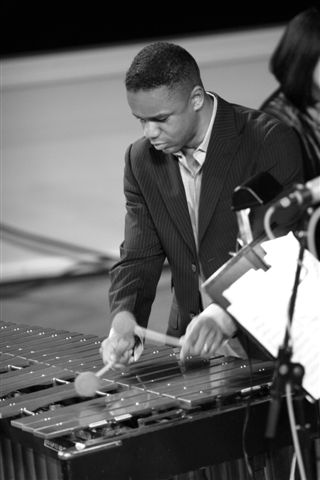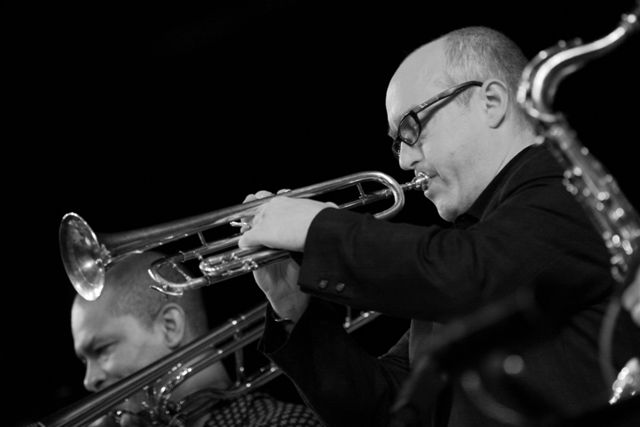
 SF Jazz Collective |
|
Story by Jean Timmons The current SF Jazz Collective members are Joe Lovano, tenor saxophone; Dave Douglas, trumpet; Stefon Harris, vibraphone; Miguel Zenon (founding member), alto saxophone; Robin Eubanks, trombone; Renee Rosnes (founding member), piano; Matt Penman, bass; and Eric Harland, drums. And what music they made. Listening was an enervating experience that I will not soon forget. I wish I could have followed them to California and join them later when they tour Europe. The concert was Shakespearean in its drama; pity I can offer here impressions only.  The concert opened with a rousing rendition of Shorter's "Armageddon," arranged by Zenon. Stefon took the first solo, gracefully moving behind his vibraphone and making those signature quick strikes of his. Zenon continued with his own flighty movements. Like Stefon, he's very physical. With "Armageddon," it was clear that these musicians are in tune with each other. The bridges, or transitions, were like little asides or comments on each other's music. Eubanks closed the piece. The next work, "Breakthrough," was an original composition of Eubanks. The careful integration of each piece in the program was reflective of a well-structured plot, with rising action that would invariably lead to a satisfying denouement. On "Breakthrough," Lovano opened with a flute. Then Eubanks posited a long, complex solo, not entirely improvised; and throughout, drummer Harland remained really cool and brought just a bit more than accompaniment to add his comment on the music.
The concert opened with a rousing rendition of Shorter's "Armageddon," arranged by Zenon. Stefon took the first solo, gracefully moving behind his vibraphone and making those signature quick strikes of his. Zenon continued with his own flighty movements. Like Stefon, he's very physical. With "Armageddon," it was clear that these musicians are in tune with each other. The bridges, or transitions, were like little asides or comments on each other's music. Eubanks closed the piece. The next work, "Breakthrough," was an original composition of Eubanks. The careful integration of each piece in the program was reflective of a well-structured plot, with rising action that would invariably lead to a satisfying denouement. On "Breakthrough," Lovano opened with a flute. Then Eubanks posited a long, complex solo, not entirely improvised; and throughout, drummer Harland remained really cool and brought just a bit more than accompaniment to add his comment on the music.This blend of improvisation and "straight" music marks this SF Collective approach. If they are playing the music of a master, it is, necessarily, premeditated. Nonetheless, the feel of spontaneity prevailed at the concert. Moreover, the new arrangements enhanced the impression of modernity. And, though she might take it as criticism (and that would be wrong) the approach of the pianist yielded sounds that had more a classical rather than a jazz orientation, on most pieces. On Shorter's "Infant Eyes," Lovano opened with a solo that was pretty, reminiscent of older masters, but really very smooth. It's been said that Lovano favored Coltrane; but on his arrangement of "Infant Eyes," this listener was reminded of Desmond playing modern music. Perhaps it was the quiet drum accompaniment of Harland, who is an exceptional drummer and protean. At one point, he was using brushes and then, without seeming preparation, he was back to sticks. On Harland's own composition, "The Year 2008" (the drummer's recognition of Barack Omaba), I could swear he was using three sticks. Then Lovano came in, off of Desmond softness and doing something amazing that captured my attention, and when my gaze returned to the dynamic Harland, he was back to two sticks. The drummer was impeccable as he took it home. Before I could get over being blown away by "The Year," pianist Rosnes opened a lovely composition by bassist Penman titled "The Angel's Share," which refers to that part of the wine (or other spirits) lost to oxidation during the winemaking process. She was joined by Stefon, who then touched off Harland. His great drum work seemed to compel the bassist whose work grew stronger as the piece developed, as did the music of trumpeter Douglas.  As stated earlier, the concert was a dramatic experience. Accordingly the audience anxiously awaited the development of each character (musician). Douglas came on strong in "Angel's," which was followed by his composition, "Secrets of the Code." With this music, the bass took the lead and Harland was on bongos until Douglas picked up the reins. His approach to the trumpet is rather muscular. He added to his piece a riff that was Bolero-like (not bossa nova). In his piece, the impression the group imparted was one of controlled energy.
As stated earlier, the concert was a dramatic experience. Accordingly the audience anxiously awaited the development of each character (musician). Douglas came on strong in "Angel's," which was followed by his composition, "Secrets of the Code." With this music, the bass took the lead and Harland was on bongos until Douglas picked up the reins. His approach to the trumpet is rather muscular. He added to his piece a riff that was Bolero-like (not bossa nova). In his piece, the impression the group imparted was one of controlled energy.By the end of the concert, the audience was on to this group. We were expecting great things and weren't disappointed. One might well conclude that the trumpet would get another chance to star on Shorter's "Footprints," and he did. But suddenly, the rhythm section became (seemingly impossible) more inspired. From the pianist, I got shades of Jarrett, which shouldn't have surprised me but it did. The trumpet and alto were into a point-counterpoint dance, followed by a long section with all horns improvising in an almost free-jazz outing that returned nicely to the melody. The audience stood as one as Harland punctuated the ending. The evening would not have been complete without an encore. The encore was Harris' composition "Road to Dharma" which I began to love as soon as Stefon revealed that the piece symbolizes the creative journey a musician embarks on when composing, one marked by uncertainty and solitude. It is a ballad that opened with a piano solo. It reminded me of the music of the MJQ, in the beginning. From piano and vibes, the music swelled with the horns. Miguel soloed beautifully. The closing was dramatic, with its little marching refrain. The music was awesome. The musicians were tip top. The road was transcendent. |